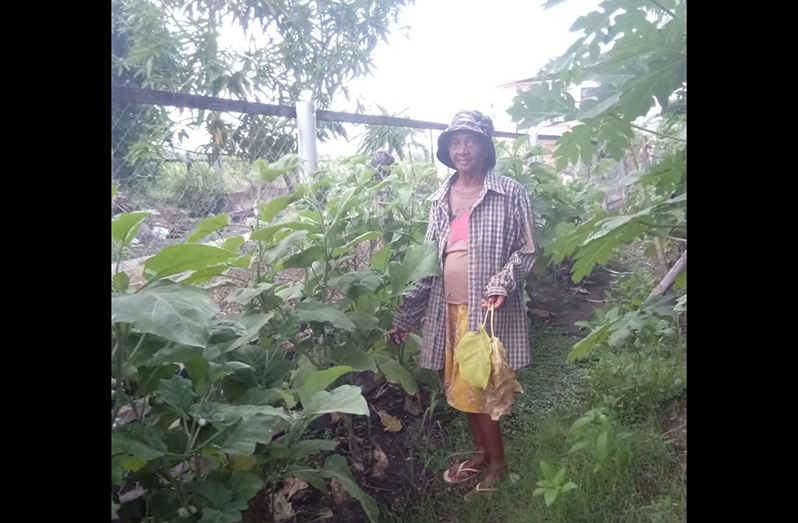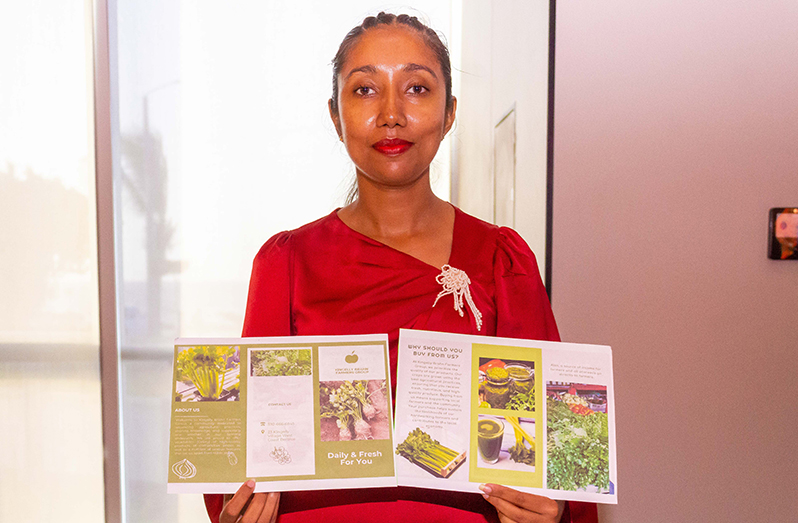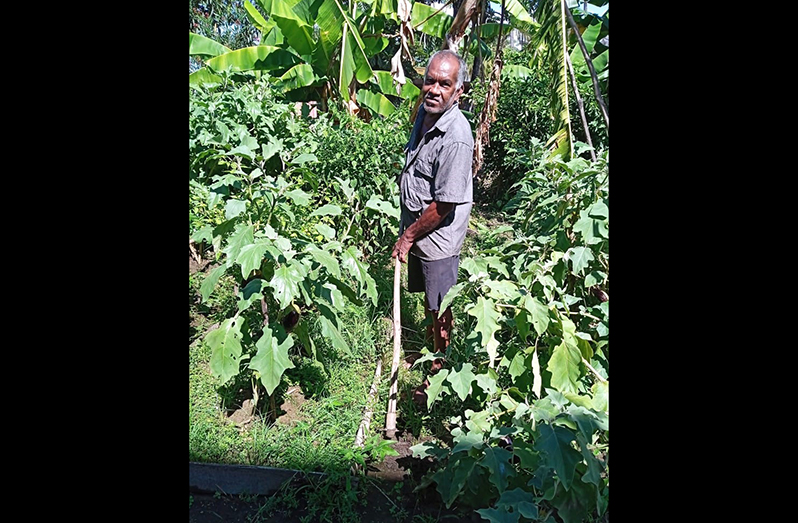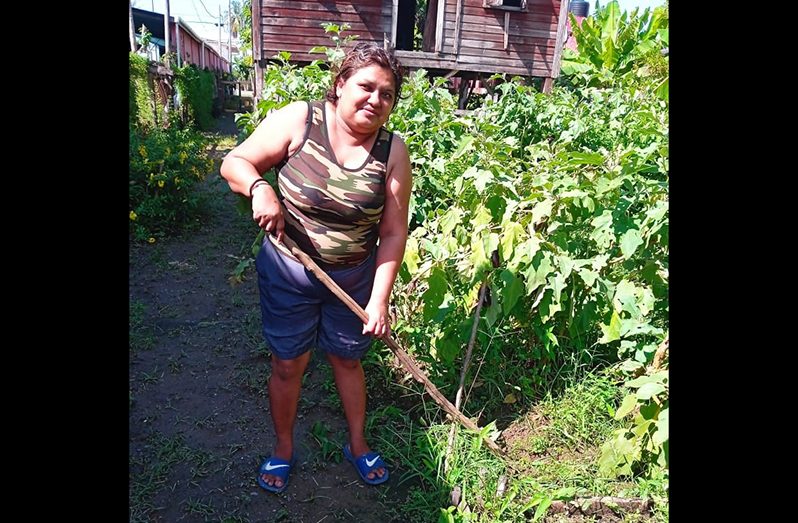MAYNAWATTIE Tiwari wanted to give back to her community and thought of no better way than to empower the people through the Kingelly’s Brahn’s Farmers Group, producing organic crops which are sold to market vendors.
Their main crop is celery, which is very pricey on the market, compared to other traditional crops.
She started the Kingelly’s Brahn’s Framers Group in March last year, and they have 10 members, including five men, who grow their own crops in their yard spaces.

Tiwari told the Pepperpot Magazine that she is looking forward to establishing their own shade house, which will be located on private land at Lot 23 Kingelly Village, West Coast Berbice.
She is a teacher at Novar Secondary School and wanted to empower people in her village who were otherwise unemployed and could not find work.
Today, the Kingelly’s Brahn’s Farmers Group has 10 farmers, some of whom are women who grow crops in their yards and almost all of them have at least two beds of celery in addition to others.
Tiwari explained that all crops grown are strictly organic, since they do not use pesticides or drugs and have alternative measures such as boiling neem leaf and spraying the affected plants to get rid of pests.

Finding purpose from a young age
The 25-year-old reported that she moved to Kingelly Village, West Coast Berbice, in 2008. During that time she would often see people engaged in various types of farming.
“When I was in Form Four, my agriculture teacher, Miss Cascee Ward, gave the class a practical homework that was to plant red stem bajiee [plant] using manure or fertiliser. I went home and told my grandfather about the homework and he got a little ice cream bowl, filled it with manure and bore two holes in the container. He went and asked the neighbour Uncle Leroy for a red stem bajiee to which he gave us the longest stem. My grandfather cut the stem short and leaves and put it in the container and told me to water it every day,” she said.
Tiwari reported that she carried the stem to school the next day and watered it every day. From then to the end of the term, the one stem became a plant and was ready to grow on the ground.
She explained that when she took it home, her grandfather cleaned approximately five banks in the backyard for gardening purposes.
“From there, after months, we were able to harvest and sell to the neighbour since she used to sell at the market in Georgetown,” she said.
Tiwari told the Pepperpot Magazine that the money received from her grandfather was used for transportation, to pay for after-school lessons, printing of SBAs, and purchasing snacks for school.
Even though Tiwari saved money by walking to school and from lessons to home, she managed the money better and budgeted for much-needed things she had to use for school, such as worksheets.
“Back then, my mother was rearing meat birds, and I would use their dung after drying it as fertiliser for my plants; but after my grandfather died, so did the garden. The bajiee leaves turned yellow, and I didn’t know what to do, and I had to leave for college (CPCE),” she said.
Tiwari added that her mother took over the gardening and planted boulanger she sold, and when it was plentiful, she also gave to the neighbours.
The entrepreneur stated that after she returned home from CPCE, she was elated to see the transformation of the dead garden into a blooming space with crops.
However, she began teaching and hardly paid attention to it, since work had consumed most of her daylight hours.

The birth of a new project
Meanwhile, because of the pandemic, Tiwari was confined to her home most of the time and decided to go back to the garden.
Her mother planted ochro, peppers, callaloo (bajiee), boulanger, tomato, celery, eschallot, black eye beans, bandanya rand ed beans.
As time progressed, Tiwari’s thoughts wandered about how my villagers can manage their gardens during the sun and the rains. Then, she decided to type out an agricultural concept plan and submit it to the government outreach in 2023.
Tiwari reported that during April of the same year (2023), she received a call responding to the agricultural concept plan for a shade house for community members.
As such, a visit was made to the site, and estimates were made with a discussion on the way forward for the project. From the first meeting, about 30 people from the community attended.
Tiwari noted that as the months went by, they were down to 10 members, four men and six women.
She stated that the members of the group are the grassroots people comprising two villages, Kingelly and Brahn, thus inspiring the name of the group Kingelly’s Brahn’s Farmers Group.
Tiwari told the Pepperpot Magazine that since the farmers’ group establishment, they had cultivated strictly organic vegetables within their yards, such as lettuce, boulanger, celery, peppers, bora, and flowering plants.
“We are hoping to extend our production in celery, coconut oil, any other agro-processing products fruits and vegetables. We envision our vegetable-farming business as a thriving and sustainable operation that serves as a model for environmentally friendly and socially responsible agriculture. We see the farm becoming a cornerstone of the local community, known for its high-quality produce and commitment to organic practices,” she said.
As chairperson of the farmers’ group, Tiwari explained that the members of the group aim to expand their farming operations, increasing both the variety and quantity of vegetables grown, while maintaining a focus on soil health and biodiversity.
She stated that they intend to maximise productivity while minimising environmental impact by implementing innovative techniques such as precision farming and vertical gardening.
“Furthermore, we envision our farm as a hub for education and outreach, offering workshops and tours to inspire others to pursue sustainable farming practices. By fostering connections with consumers through farmers’ markets, NAREI programmes, and partnerships with local restaurants and grocery stores, we aim to create a direct and transparent supply chain that benefits both customers and the local economy,” Tiwari said.





.jpg)








